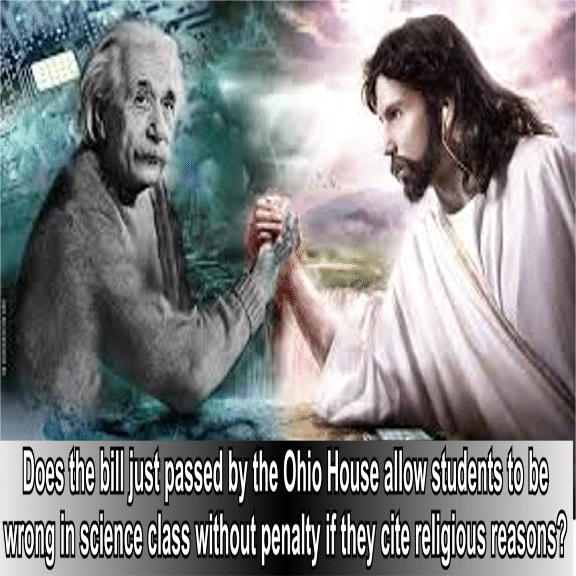Does the bill just passed by the Ohio House allow students to be wrong in science class without penalty if they cite religious reasons?
But the bill’s sponsor, state Rep. Timothy Ginter (R), says that’s not so. So does Charles Haynes, founding director of the Religious Freedom Center at the Freedom Forum Institute, which is the the education and outreach partner of the Freedom Forum and the Newseum in Washington D.C.
The legislation, HB 164, would do the following if it became law, according to an analysis from the Ohio Legislative Service Commission, a bipartisan agency that provides the Ohio General Assembly with budget and fiscal analysis:
- Allow students to engage in religious expression in the completion of homework, artwork or other assignments
- Prohibit public schools from rewarding or penalizing a student based on the religious content of a student’s homework, artwork or other assignments
This is the specific language in HB 164:
Sec. 3320.03. No school district board of education, governing authority of a community school established under Chapter 3314. of the Revised Code, governing body of a Sec. STEM school established under Chapter 3326. of the Revised Code, or board of trustees of a college-preparatory boarding school established under Chapter 3328. of the Revised Code shall prohibit a student from engaging in religious expression in the completion of homework, artwork, or other written or oral assignments. Assignment grades and scores shall be calculated using ordinary academic standards of substance and relevance, including any legitimate pedagogical concerns, and shall not penalize or reward a student based on the religious content of a student’s work.
Ginter was quoted by WKRC as saying: “Under House Bill 164, a Christian or Jewish student would not be able to say my religious texts teach me that the world is 6,000 years old, so I don’t have to answer this question. They’re still going to be tested in the class and they cannot ignore the class material."
But Gary Daniels, chief lobbyist for the American Civil Liberties Union of Ohio, said the measure does in fact allow students to answer homework questions and other assignments incorrectly, based on religious doctrine rather than science — and not be marked wrong. Cleveland.com quoted him as saying: “Under HB 164, the answer is ‘no,’ as this legislation clearly states the instructor ‘shall not penalize or reward a student based on the religious content of a student’s work.' ”
It also quoted Amber Epling, spokeswoman for Ohio House Democrats, as saying that based on the analysis from the Ohio Legislative Service Commission, she believes students can be scientifically incorrect based on religion and not be penalized.
Numerous states in recent years have considered scores of anti-science bills — usually aimed at affecting classroom discussion on evolution and climate change. Those measures typically take one of two approaches, according to the nonprofit National Center for Science Education, which seeks to CONTINUE READING: Does the bill just passed by the Ohio House allow students to be wrong in science class without penalty if they cite religious reasons? - The Washington Post

